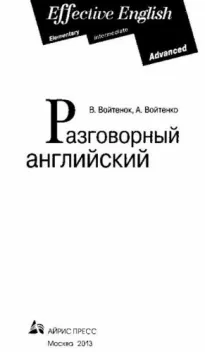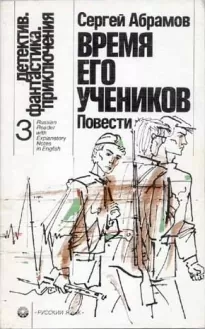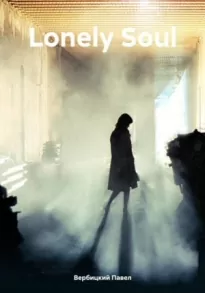Разговорный английский

- Автор: Владимир Войтенок
- Жанр: Самиздат, сетевая литература
Читать книгу "Разговорный английский"
I asked him to give me an injection. He filled a syringe with a liquid called cocaine. I felt a little prick on the gum and then he injected the cocaine. He did this in two or three places and waited for a minute or so.
My mouth felt rather dead. Then he took a pair of forceps, gripped the tooth, gave a twist, then a pull, and the tooth was out. I could see it and hear it but I couldn’t feel it. Then he said, “It’s all over. Spit in there and then wash your mouth out with this disinfectant.”
Л/ter “Essential English for Foreign Students ” by G. E. Eckersley.
5. SLEEP
G. Good morning, Mrs. Hamilton. Tom is up, isn’t he?
Mrs. H. Tom up? I don’t think he is. You might as well go in and see for yourself. (They both go into the bedroom.) Well, here he is — sleeping the sleep of the just.
G. Yes, dead asleep. He’s snoring rather loudly, I should say. Mrs. H. He’s sleeping on his back. Tom! Wake up, Tom!
T. (In his sleep.) Give it back, do you hear?
G. He’s talking in his sleep. (Shaking him.) Tom, get up, you —.
T. Eh! What the —. Oh, that(’s) you, George!
G. No other. When do you intend to get up, I should like to know?
T. Get up? Why, what’s the time, anyway?
G. It’s time to get up, that’s what it is. You haven’t forgotten, I hope, that we are to be at the station for the 8.30 train?
Mrs. H. Well, Tom, be quick about it. I’ll make you a hasty breakfast while you wash and dress. Will you join Tom with the breakfast, George?
G. I don’t mind if I do. I didn’t have it at home. Thought I’d be late.
T. Switch on the radio, George, will you?
G. I say, Tom, here’s no time for any jerks now. You get along and wash yourself.
T. All right, (After some minutes Tom comes in. He begins to dress.)
G. You are a heavy sleeper, Tom, you are.
T. Well, I went to bed late last night, you know.
G. I suppose you think you never snore.
T. I know I don’t.
G. My aunt!
(Mrs. H. comes into the room)
Mrs. Hamilton, did you hear what —?
Mrs. H. I did indeed, but I don’t think you have time to argue about that now. Come, breakfast is ready.
VI. At Home
1. THE HOUSE
In many parts of England cottages are built in a long row, each house joined to the next one, and each with a small yard at the back, and a still smaller one at the front. On the ground floor there are generally two rooms, and on the upper one, the first floor, two. In the bigger of the lower rooms food is prepared, meals are eaten and guests are received. Such a room is called a kitchen or simply a living-room.
Here is the description of such a living-room.
It has three doors: the one in the centre leads out on to the street, the one on the right — to the stairs landing to the first floor, and the one on the left — to a bedroom on the ground floor. There is a fireplace on the right. Dark curtains cover the window at the back.
The room contains a table, some chairs and a comfortable rocking chair placed by the fireplace. On the left there is a cupboard with a shelf above it on which are a few dishes. A birdcage hangs in the window. On the wall near the fireplace hangs a large calender with a bright coloured picture of some cows drinking at a stream. Over the table hangs a gas-lamp and by the fireplace is a small gas-ring with a little tin kettle on it.
The cottages of the well-to-do people, however, are a little larger, pretty and comfortable. They stand a little way back from the road and some have a rather big garden round it and a smooth lawn in front of the house.
You go through the garden gate and walk along a path leading to the house. Mounting a few steps you get on to a verandah and right in front of you is the entrance door. Passing through this door you find yourself in the hall where in the comer is a sort of a cloakroom with racks to hang your coat and hat on.
There are some 3—4 doors (depending upon the plan of the house) which lead to the kitchen, study, dining-room and lounge or sitting-room. The sitting-room is a big room some 20—25 feet long and about 15—18 feet wide. In the sitting-room there might be a thick carpet on the floor, one or two good water-colours on the walls, a piano on one side of the room, a radio (television) set on the other side, a bookcase standing against the wall, a small table near the window with a beautiful bowl of flowers, and a couch.
The dining-room is also a pleasant-looking room with a carpet, a dark oak dining-table, which, being unfolded might seat 10—12 persons, six chairs and a side-board. A red lamp-shade hanging down from the ceiling gives a warm colour to the room, and a central (or electric) heating system keeps it warm and comfortable.
Upstairs are the bedrooms, a bathroom and a lavatory, though the latter two might be in some cottages on the ground flood as well.
2. MOVING
PETER. I say, Nick, you are not moving, are you?
NICK. Yes, we are. We have been given a flat.
PETER. Really! You are lucky, you know.
NICK. We are indeed. Three rooms, a kitchen, a bathroom, gas, a balcony overlooking the main street, a —.
PETER. Even in the main street! By gosh!
NICK. Yes. Isn’t that fine! A four-storey house with a shop in the ground storey. You just go out into the street through the main door and here you are, almost in the shop.
PETER. It’s not that house at the corner of N. and M. streets, is it?
NICK. Just so. You can’t imagine how Mother will be surprised. PETER. Why, doesn’t she know?
NICK. No, she doesn’t. She’s gone to our relatives in N. I say, Peter, couldn’t you lend a hand in loading the lorry?
PETER. To be sure. Come on. What’s there to load?
NICK. Why, everything!
(In the new house. Nick, his father, his sister, Ann and Peter)
NICK. What a marvellous flat!
FATHER. Yes, it’s a fine flat indeed. The house is the last word of comfort.
NICK. Which room will be mine, Father?
FATHER. Now, let’s have a look round. This small room will be —. NICK. Will be mine, won’t it, Daddy?
FATHER. Now stop prattling, and be a sensible girl, Ann. So this small room will be our bedroom. One of these communicating rooms will be the dining-room and the other will be yours.
NICK. Am I going to be with her again, Dad? You can’t imagine what a bother she is. I can never get through with my exercises when she is round about.
ANN. That’s not true, Daddy! He always starts teasing me first.
FATHER. Tut, tut! Well, all right. Let this small room be yours, Nick. Ann will be with us.
NICK. Oh, that’s fine. I’ve always dreamt to have a room of my own. Well, let’s start arranging the furniture. Come on, Peter, help me with this bookcase, will you?
PETER. Yes, for sure.
3. RENTING
(Tenant and Landlady.)
T. Have you a room to let?
L. Yes, sir. What room do you require? A double-bedded room or single?
T. I want a furnished living-room on the ground floor with boarding and attendance.
L. How long will you require it?
T. I intend to stay about two months. Will you show me what rooms you have?
L. Certainly. Will you come this way?
T. I like the room. It is tidy and comfortable. Is this a feather-bed?
L. Yes, sir. The room is furnished and carpeted all over as you see. Here is a wardrobe where you can hang up your clothes.
T. I need a table to work at. This wash-stand I would like to be removed.
L. Yes, sir.
T. I will want hot water and my boots cleaned every morning.
L. Yes, sir.
T. And my breakfast must also be ready at eight precisely. What will the price be including board and attendance?
L. How will you take the room, by the week or by the month?
T. Does it make any difference?
L. It does, sir. If you take it for two months, you can have it for 6 pounds a month.
T. And, suppose I take it by the week?
L. You will be charged much more, sir.
T. All right. I take it for two months in that case.
L. When will you move in, sir?
T. Today. Can you let me have a latch-key of my own? By the way, where does this door lead to?
L. To the street, sir.
T. That’s very good. I wouldn’t like to disturb you when I come home late in the evening.
L. I will provide you with a key, sir.
T. Very good. Is there a post office near by? I shall have a large correspondence.
L. Over at the station, sir.
T. That’ll be very convenient. You may expect me in the evening.
L. Yes, sir.
4. HOUSEKEEPING
1
A good housewife, as a rule, rises early in the morning. First of all she makes a fire in the stove and begins to make coffee and get breakfast ready. By the time breakfast is ready, her husband and children are up, too.
Breakfast is over, but her work is not; it has only just begun. While the eldest daughter attends to the children, she tidies the rooms. She sweeps the floors, makes the beds, dusts the furniture, etc. When everything in the house is quite neat and in good order, she goes marketing and buys provisions for the day. After that she begins to prepare lunch. When she sits down to lunch at midday, she feels fairly tired, and yet the day holds some more fatigue in reserve for her. There is the dinner to be cooked, but as it happens to be washing-day, there is a bundle of clothes to be washed and dried. The ironing and mending is generally done on evenings. Now that the washing is done, there comes the dinner to be prepared. It must be ready by the time Father comes home from his work at six o’clock.
While Father smokes his pipe after dinner, she clears the table and washes up the dishes. And that is not all. In a short while the smaller children are to be washed and put to bed. It is only late in the evening that she manages to sit down in the arm-chair, but not to rest. There are the socks and stockings to be darned and the clothes to be mended. She takes out her workbox with her scissors, reels of cotton and silk thread, pins and needles, caps her middle finger with her thimble and down she gets to mending the clothes, putting on a patch here and sewing up a rent there. The evening has far advanced into the night and everything is quiet in the house. Even Father has long ago put away his evening newspaper and gone to bed, but Mother is still at work — up first, she goes to bed last.
2
A. But you musn’t get up, ma. The doctor has strictly prohibited you to do so.
M. I know, but there’s so much to do about the house, my dear.
A. You needn’t fear, Mother dear. You leave that to me.
M. Will you be able to manage the household, my dear?
A. Of course, ma. And I think I’ll be able to cook a dinner, too.
M. Yes, but you do the beds and tidy up the rooms first.
A. Yes, ma. Must I change the linen?
M. Do so, please. Tie the dirty things into a bundle and put them into the closet.
A. Shall we do any washing today?
M. No, not today. Now that I am ill we might have to give it to the laundry.
A. I’ll wash it myself tomorrow, ma.
M. We will see. Now, don’t forget to sweep the comers, Ann.
A. Yes, ma. Is this the rag to dust the furniture?
M. No, Ann, that rag is too coarse. There is a soft rag in the closet.
A. When are we going to buy a vacuum-cleaner, ma? It’s ever so much easier to dust the room with it.
M. It might be, Ann, but I’m accustomed to do it in the old way.
A. I will tell Dad to buy one. Well, ma, the rooms are done. Isn’t it time to cook dinner?
M. It is, dear. Oh, my! I forgot to tell you to mend the fire; it has gone out, I’m sure.
A. I will go and see, ma.
M. Please, do. And if the fire hasn’t gone out, poke it, put some chips and thrust a shovel of coal on top.
A. Yes, ma. (Goes out. After some time comes in.)
M. Well, Ann, has —. My! You just look at yourself in the mirror, Ann!
A. Why? Is anything the matter with me, ma?
M. You are dirty all over with soot. And look at your sleeves! What have you been doing there?
A. Well, ma, the fire was out and I had to remake it. Then the stove seemed to draw very badly.
M. You go and wash yourself and change your dress.
A. What a nuisance these kitchen stoves are, ma. Mary has such a nice gas-stove at their house; it’s so nice and clean, and then one has no need to trouble with that nasty coal and ... and get dirty.
M. Talk what you like, Ann, but I feel comfortable in our little cottage even without gas.
A. Yes, mama, but see what it leads to, this stove, I mean. I’ve —.
M. There, there, my dear. Go and wash yourself and be quick about it; there’s so much to do in the kitchen. There are the dishes to be washed up — You didn’t wash them in the morning, Ann, did you?
A. No, ma. How could I when I was out shopping?
M. Quite true, dear. Then dinner has to be ready by the time. Father comes home. Oh, my! I’ll have to get up, after all.
A. But you mustn’t, ma. The doctor —.
M. Well, I can, at least, sit there in the rocking-chair and help you by word of mouth.
VII. Meals
1. AT THE RESTAURANT
GEORGE. Well, here we are, Tom. Let’s take off our coats. ATTENDANT. Allow me to help you off your coats, gentlemen?
TOM. It’s a snug place, isn’t it?
HEADWAITER. Where would you like to sit, gentlemen?
GEORGE. Over there in the corner, I suppose.
TOM. It’s a snug place, isn’t it?
GEORGE. Yes, and quite out of the way of people.
TOM. Let’s see what they have. (He takes up the menu.) What about an omelette?
GEORGE. I’d rather have some fish.
TOM. And afterwards a nice beefsteak?
GEORGE. Just so.
TOM. Waiter!
WAITER. Directly, gentlemen. (He comes up to them.) What do you wish, gentlemen?
TOM. Omelette for one, fish for one, and beefsteak for two.
WAITER. Do you prefer the beefsteaks underdone or —? TOM. We don’t mind provided they are tender.
WAITER. Will you have any dessert?
TOM. What pastry have you?
WAITER. We have apple-pie.
GEORGE. Have you any pudding?
WAITER. Yes, sir. Plum-pudding and rice-pudding.
GEORGE (to Tom). What about plum-pudding, Tom?
TOM. Yes. Two plates, please.
WAITER. Yes, sir. Any cheese?
TOM. No cheese for me. What about you, George?
GEORGE. I’ll take a cup of coffee. Won’t you have one also?
TOM. Yes. Make it two. That’ll be all, 1 suppose.
GEORGE. A glass of fresh water for me, please.
WAITER. Yes, sir.
TOM. What have we to pay, waiter?
WAITER.... shillings and sixpence, sir.
TOM. Here you are. Have you change for a pound note?
WAITER. Yes, sir. There it is ... shillings and sixpence.
TOM. Forget the sixpence.
WAITER. Thank you, gentlemen. Goodbye.
2. TOMMY AT LUNCH
MOTHER. Tommy, lunch is ready.
TOMMY. I don’t want to eat, Mummy.
MOTHER. But you must, Tommy. TOMMY. No.
MOTHER. I insist upon your eating. Just a little bit, my boy.
TOMMY. No.
MOTHER. Now, Tommy, be a good boy. Just sit down here and have a little bit of fish.
TOMMY. I want Grannie to sit next to me.
MOTHER (to Grandmother). Sit down with him, Mother dear, and try to make him eat.
GRANDMOTHER. Well, here, Tommy. Have some fish. There’s a dear.
TOMMY. That’s too much.
MOTHER (takes away some). Will that do now, Tommy? TOMMY. I want the cat to sit here.
MOTHER. Oh, my! What a troublesome boy you are, Tommy! (Places the cat on another chair.) There now. Eat, will you?
TOMMY. The cat wants to eat too.
MOTHER. What am I to do with this boy? Well, give it some then, but do eat, will you? (Tom begins feeding the cat.) Are you ever going to eat anything yourself, Tommy?
TOMMY. The cat hasn’t eaten enough yet.
MOTHER. You make my blood boil, Tommy, the way you behave. (To Grandmother.) Mother dear, can you do anything with that boy? He is altogether out of hand. I can’t stand it any more. (Goes away.)
GRANDMOTHER. Now, Tommy, stop trifling with the fish, will you?
TOMMY. I am picking out the bones, Grannie. The cat won’t eat bones, will it?
GRANDMOTHER. But there is hardly anything left there now. You have given it all away to the cat!
TOMMY. But I don’t want any, Grannie, really not.
GRANDMOTHER. Well, drink your coffee then. It has already grown cold.
TOMMY. Coffee? I want some milk.
GRANDMOTHER. But there is no milk left, Tommy. TOMMY. All the better. I want to play.
3. AT DINNER
ANN. Good morning, John. Come in, please.
JOHN. Thank you. Is Fred at home?
ANN. Yes, he’s in his study. This way, please.
JOHN. Hello, old chap. How goes the world with you?
FRED. Fine. So nice of you to have come. We are about to have dinner.
ANN. Will you dine with us, John?
JOHN. With the greatest pleasure. I’m ever so hungry.
ANN. That’s fine. Well, I’m off to lay the table. Excuse me, please.
JOHN. By all means.
At Table
FRED. Say, John, what about a drink?
JOHN. Will a duck swim?1
FRED. Here, down this.
JOHN. To you, Ann. But you are ftot —.
ANN. No, thank you. I never take wine.
FRED. Well, here’s something for you, Ann. Hand me your tumbler, please. Well, John, be good. Ann? {They drink.)
JOHN. It’s good to be in a company like this.
ANN. Let me help you to some salad, John.
JOHN. Please do. That’s quite enough, thank you.
ANN. Some soup, John?
JOHN. Why, yes! I think I could manage a plateful.
ANN. How do you find it?
JOHN. Awfully nice, really. Don’t you think so, Fred?





